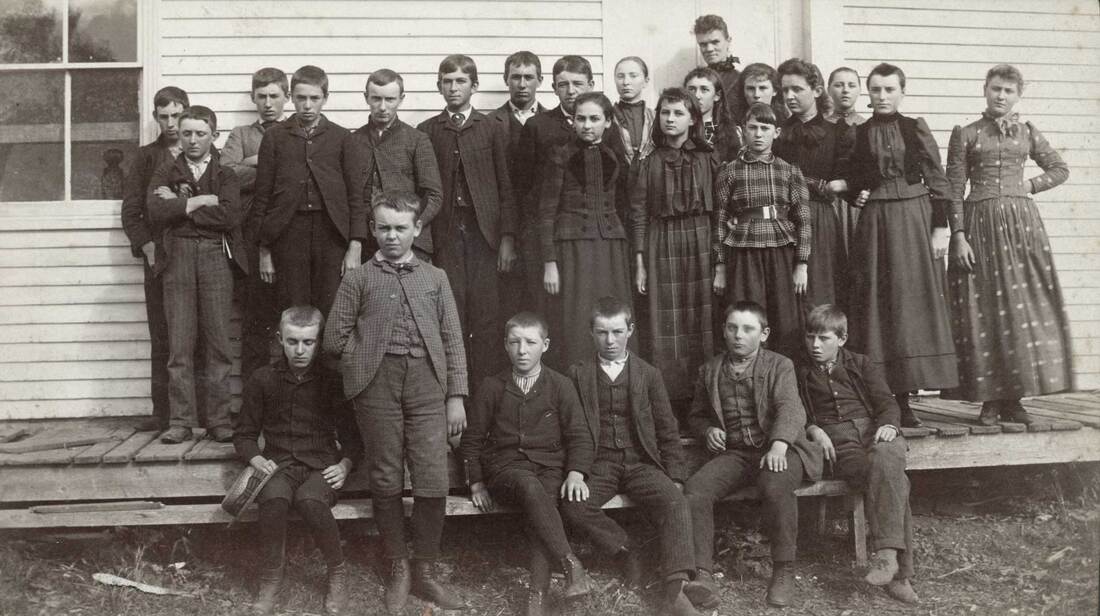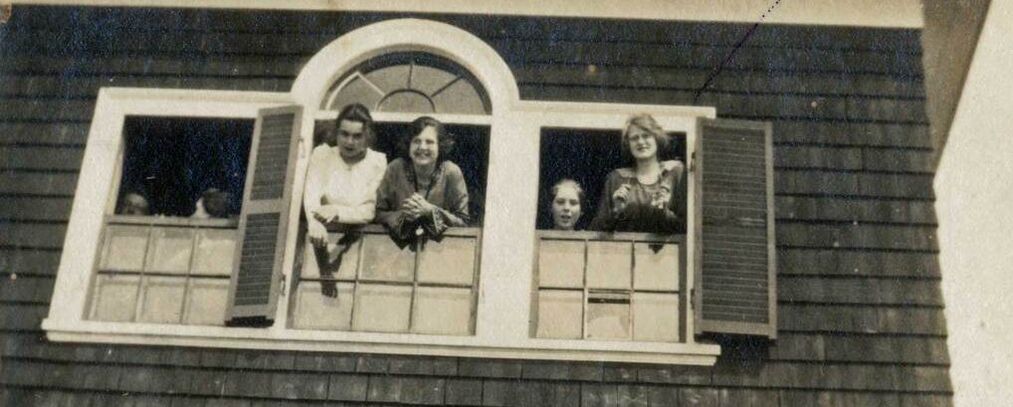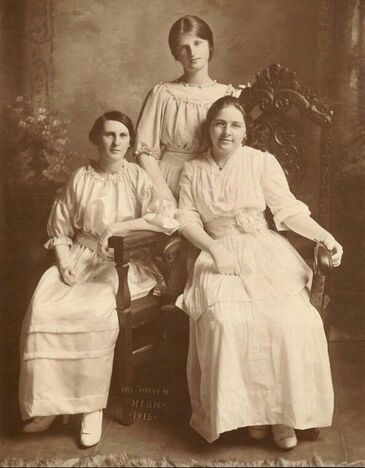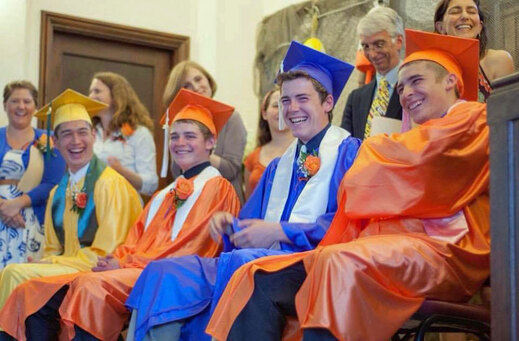A FREE HIGH SCHOOL
When we thought we knew enough to enter high school, we would take a written test and if we got passing rank we would be admitted to high school…Thus there might be several years difference in ages. A few graduated at 16 instead of the usual 18 years.
Nettie Beverage Crockett, North Haven High School Class of 1912, Personal recollections, 1966
During most of the 1800s in the United States, schooling beyond the age of 14 was not required and attending secondary schools required tuition. Following the Civil War, public secondary schools began opening across the country and in North Haven a “Free High School” program started in the late 1880s. Initially, it was only a two-year program and one teacher taught all subjects.
Incoming students were required to pass an entrance exam, commonplace throughout the United States. Such testing limited the number of people going on to high school, leaving many to instead begin work or start a family after completing 8th grade. On North Haven, the education at the district grammar schools was considered so limited that most students failed the exam and were excluded from entering high school. As a result, the high school lacked sufficient numbers and closed from 1897 to 1899.
While records do not indicate how or why, within a couple years island students succeeded in passing entry exams so that the Free High School reopened in 1900. Superintendent Fremont Beverage noted its success and called for its continuation:
The High School is the connecting link between the town schools and the Normal schools, academies, and college fitting schools. It is a strong agent in waking up pupils, drawing out their latent talents, and creating a desire to go higher…We cannot conceive how any intelligent, fair-minded person who has watched the progress of this school can conscientiously vote against raising a small sum for the support of a Free HIgh School another year. Let us not only support it this year, but make it a permanent thing so that we may know for what we are working.
Fremont Beverage, Superintendent of SchoolS, North Haven Town Report, 1901
By 1904, the high school expanded its program to four years and the school committee noted, “We endorse the work being done in the High School and heartily recommend its continued support.” North Haven held its first high school graduation exercises in 1907 at the Pulpit Harbor Church with five young women, Elsie Beverage, Jennie Beverage, Linda Beverage, Marion Brown, and Muriel Judkins receiving diplomas. Fifty years after their graduation, Marion Brown Casperson wrote:
My high school class, the first one to graduate was all girls, and few at that…as I recall it, our chief interest was getting as much education as we could so that some of us would be able to enter college…Don’t get the idea that we were just a bookish, snobbish lot…That was not true. I remember that we spent many a noon hour during the winters indoors, sometimes square dancing, sometimes arguing scientific or political subjects…We once had an argument on the theory of sound that went on for weeks of recess time…We never settled it.
North Haven High School yearbook, The Pilot, 1957
Jennie O. Beverage, another member of the first high school graduating class in 1907, recalled:
The students then were just the same as now, fun loving, noisy, whispering, and writing notes, but while honoring and respecting the school and its teachers who inculcated in the minds of their pupils a sense of responsibility and a desire for greater things, so that the graduates have gone into all parts of the country and all phases of work never forgetting the training and instruction received in the old North Haven High School.
North Haven High School Yearbook, The Pilot, 1940
Nettie Beverage Crockett, North Haven High School Class of 1912, Personal recollections, 1966
During most of the 1800s in the United States, schooling beyond the age of 14 was not required and attending secondary schools required tuition. Following the Civil War, public secondary schools began opening across the country and in North Haven a “Free High School” program started in the late 1880s. Initially, it was only a two-year program and one teacher taught all subjects.
Incoming students were required to pass an entrance exam, commonplace throughout the United States. Such testing limited the number of people going on to high school, leaving many to instead begin work or start a family after completing 8th grade. On North Haven, the education at the district grammar schools was considered so limited that most students failed the exam and were excluded from entering high school. As a result, the high school lacked sufficient numbers and closed from 1897 to 1899.
While records do not indicate how or why, within a couple years island students succeeded in passing entry exams so that the Free High School reopened in 1900. Superintendent Fremont Beverage noted its success and called for its continuation:
The High School is the connecting link between the town schools and the Normal schools, academies, and college fitting schools. It is a strong agent in waking up pupils, drawing out their latent talents, and creating a desire to go higher…We cannot conceive how any intelligent, fair-minded person who has watched the progress of this school can conscientiously vote against raising a small sum for the support of a Free HIgh School another year. Let us not only support it this year, but make it a permanent thing so that we may know for what we are working.
Fremont Beverage, Superintendent of SchoolS, North Haven Town Report, 1901
By 1904, the high school expanded its program to four years and the school committee noted, “We endorse the work being done in the High School and heartily recommend its continued support.” North Haven held its first high school graduation exercises in 1907 at the Pulpit Harbor Church with five young women, Elsie Beverage, Jennie Beverage, Linda Beverage, Marion Brown, and Muriel Judkins receiving diplomas. Fifty years after their graduation, Marion Brown Casperson wrote:
My high school class, the first one to graduate was all girls, and few at that…as I recall it, our chief interest was getting as much education as we could so that some of us would be able to enter college…Don’t get the idea that we were just a bookish, snobbish lot…That was not true. I remember that we spent many a noon hour during the winters indoors, sometimes square dancing, sometimes arguing scientific or political subjects…We once had an argument on the theory of sound that went on for weeks of recess time…We never settled it.
North Haven High School yearbook, The Pilot, 1957
Jennie O. Beverage, another member of the first high school graduating class in 1907, recalled:
The students then were just the same as now, fun loving, noisy, whispering, and writing notes, but while honoring and respecting the school and its teachers who inculcated in the minds of their pupils a sense of responsibility and a desire for greater things, so that the graduates have gone into all parts of the country and all phases of work never forgetting the training and instruction received in the old North Haven High School.
North Haven High School Yearbook, The Pilot, 1940
Through the early 1900s, the high school continued with just one teacher who taught multiple subjects and also served as the principal. In numerous town reports, school superintendents called for the need to employ an additional teacher. Leon C. Staples voiced his concerns in 1917:
In retiring from office I want to confess frankly that our High School is far from satisfactory. The material equipment, such as desks, chemical and physical apparatus, books and maps, is inadequate…A one-teacher-school with four classes is manifestly impossible. Few teachers are equipped to teach all high school subjects under the present plan. It should be the first duty of the new superintendent to attempt the solution of many of the pressing problems connected with our High School.
North Haven Town Report, 1917
At the continued urging of administrators, North Haven High School became a Class A high school in 1921, which required the school to have two teachers. To accommodate a total of 36 students, the school enlarged the school laboratory, expanded classroom spaces, installed new windows to improve the lighting, provided a fire escape, added books to the school library, and supplied additional desks.
With such expansions, North Haven followed a national “high school movement” in education where throughout the first half of the 20th century high schools across the country increased funding, hired more teachers, offered open enrollment, and provided a practical curriculum. North Haven Superintendent E.A. Smalley noted “Although somewhat crowded, the building fulfills all requirements at present. But should the school continue to grow, more adequate accommodations must be provided in a few years.”
Over the decades, North Haven’s high school population has fluctuated along with that of the island community. In 2017, when high school enrollment dropped to below 10 students, North Haven created a magnet school program to attract students to the island. Keeping the high school thriving and offering an education program through grade 12 remains a constant focus for families, teachers, and the greater island community.
The completion of high school has long been a celebratory crossroads in life, filled with a swirling mixture of pride, joy, anxiety, sadness, relief, and hope. Leah Young Beverage recalled the journey through high school to her 1916 graduation:
When I come to graduation there was just us three girls -- myself, Bernice Crockett, and Ruth Brown; and the principal we had, he said, “Just three girls -- no graduation exercises!” But we had a graduation! We had graduation exercises up to the old church -- got our diploma…We had studied for four years, we had cake sales and put on little entertainments and everything to earn money; we had earned our class rings and earned our graduation photos and we said we were going to have a graduation!
Interview with Eliot Beveridge, circa 1980
In retiring from office I want to confess frankly that our High School is far from satisfactory. The material equipment, such as desks, chemical and physical apparatus, books and maps, is inadequate…A one-teacher-school with four classes is manifestly impossible. Few teachers are equipped to teach all high school subjects under the present plan. It should be the first duty of the new superintendent to attempt the solution of many of the pressing problems connected with our High School.
North Haven Town Report, 1917
At the continued urging of administrators, North Haven High School became a Class A high school in 1921, which required the school to have two teachers. To accommodate a total of 36 students, the school enlarged the school laboratory, expanded classroom spaces, installed new windows to improve the lighting, provided a fire escape, added books to the school library, and supplied additional desks.
With such expansions, North Haven followed a national “high school movement” in education where throughout the first half of the 20th century high schools across the country increased funding, hired more teachers, offered open enrollment, and provided a practical curriculum. North Haven Superintendent E.A. Smalley noted “Although somewhat crowded, the building fulfills all requirements at present. But should the school continue to grow, more adequate accommodations must be provided in a few years.”
Over the decades, North Haven’s high school population has fluctuated along with that of the island community. In 2017, when high school enrollment dropped to below 10 students, North Haven created a magnet school program to attract students to the island. Keeping the high school thriving and offering an education program through grade 12 remains a constant focus for families, teachers, and the greater island community.
The completion of high school has long been a celebratory crossroads in life, filled with a swirling mixture of pride, joy, anxiety, sadness, relief, and hope. Leah Young Beverage recalled the journey through high school to her 1916 graduation:
When I come to graduation there was just us three girls -- myself, Bernice Crockett, and Ruth Brown; and the principal we had, he said, “Just three girls -- no graduation exercises!” But we had a graduation! We had graduation exercises up to the old church -- got our diploma…We had studied for four years, we had cake sales and put on little entertainments and everything to earn money; we had earned our class rings and earned our graduation photos and we said we were going to have a graduation!
Interview with Eliot Beveridge, circa 1980
After graduation, young people from North Haven face the question -- to stay on the island or leave its familiar shores? Many experience anxiety leaving a small tight-knit community for college or work or travel. If they go on to pursue a college education, many young people grapple with whether they can return to the island someday and put their degree “to use.” If they stay or leave and return, how can they find their niche in a hometown where at times opportunities seem limited and change meets resistance? How do they contribute to their community, toward the care of all its members, and toward its economic and cultural survival?
Many school administrators point pridefully to high percentages of their graduates going on to college, as though that proves the excellence of their learning program…A school has no business attaching greater prestige to some futures than it does to others…Students who elect to stay in their hometown often do not get a fair deal; they should have as rich and relevant a school program as those bound for college…The school must vigorously support all alternatives.
Schooling in Isolated Communities, Tom Gjelten, 1978
We have students who go on to selective private colleges, and students who go on to large universities. We have students who join the military right out of high school, and students who go on to cosmetology school. The gift of this school is that it values and supports each of these students and each of these choices with the same enthusiasm.
John Dietter, teacher at North Haven Community School 1995 to 2011, “Treasured Island,” Edutopia, April/May 2008
Many school administrators point pridefully to high percentages of their graduates going on to college, as though that proves the excellence of their learning program…A school has no business attaching greater prestige to some futures than it does to others…Students who elect to stay in their hometown often do not get a fair deal; they should have as rich and relevant a school program as those bound for college…The school must vigorously support all alternatives.
Schooling in Isolated Communities, Tom Gjelten, 1978
We have students who go on to selective private colleges, and students who go on to large universities. We have students who join the military right out of high school, and students who go on to cosmetology school. The gift of this school is that it values and supports each of these students and each of these choices with the same enthusiasm.
John Dietter, teacher at North Haven Community School 1995 to 2011, “Treasured Island,” Edutopia, April/May 2008



